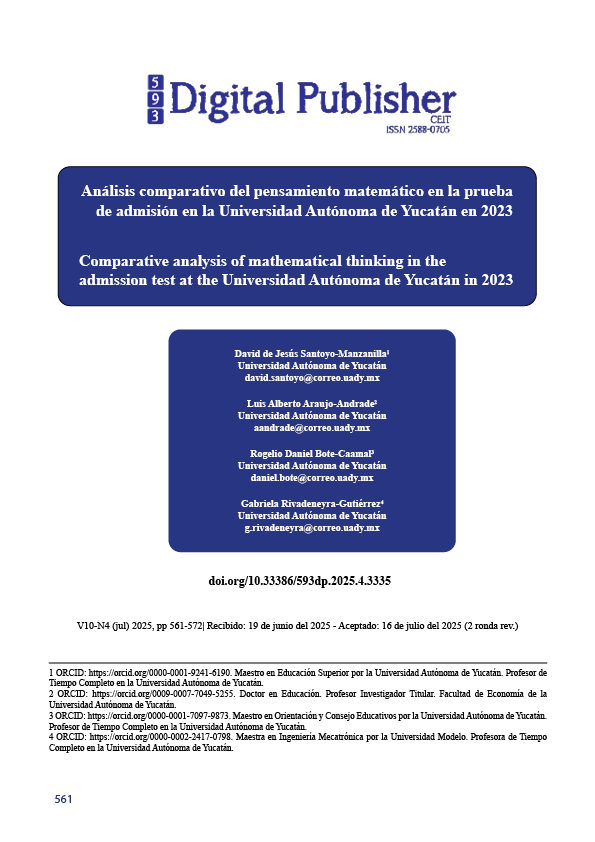Análisis comparativo del pensamiento matemático en la prueba de admisión en la Universidad Autónoma de Yucatán en 2023
Contenido principal del artículo
Resumen
El pensamiento matemático es una habilidad importante para el ingreso a la universidad por su correlación con otras variables de éxito académico. Por ello, se planteó el objetivo de analizar y comparar el pensamiento matemático de los aspirantes a las licenciaturas de la Universidad Autónoma de Yucatán (UADY) en el proceso del 2023. Para ello, se elaboró una base de datos con los 11,776 aspirantes y se realizó un estudio analítico comparativo. Los resultados indican que el 29% de los aspirantes es admitido y que el campus con una mayor demanda de aspirantes se encuentra en el campus de Ciencias de la Salud lo que lo hace de mayor competencia y menor probabilidad para ingresar a una licenciatura. El campus con mayor probabilidad de admisión es la Unidad Multidisciplinaria Tizimín, con el 57.3% de admisión. Por otro lado, también se encontró que el campus con mayor puntaje de pensamiento matemático fue el de Ciencias de la Salud, y el de menor puntaje fue la Unidad Multidisciplinaria Tizimín. Las estadísticas descriptivas ponen en evidencia que existen estudiantes que fueron admitidos debido a su puntuación global del EXANI-2 pero que tienen una puntuación baja de pensamiento matemático. Se concluye que el pensamiento matemático es un factor importante para los estudiantes de nuevo ingreso y que garantizar esta habilidad eleva los estándares académicos y científicos de la universidad como una institución de formación académica y científica.
Descargas
Detalles del artículo

Esta obra está bajo una licencia internacional Creative Commons Atribución-NoComercial-CompartirIgual 4.0.
1. Derechos de autor
Las obras que se publican en 593 Digital Publisher CEIT están sujetas a los siguientes términos:
1.1. 593 Digital Publisher CEIT, conserva los derechos patrimoniales (copyright) de las obras publicadas, favorece y permite la reutilización de las mismas bajo la licencia Licencia Creative Commons 4.0 de Reconocimiento-NoComercial-CompartirIgual 4.0, por lo cual se pueden copiar, usar, difundir, transmitir y exponer públicamente, siempre que:
1.1.a. Se cite la autoría y fuente original de su publicación (revista, editorial, URL).
1.1.b. No se usen para fines comerciales u onerosos.
1.1.c. Se mencione la existencia y especificaciones de esta licencia de uso.
Citas
Alzahrani, A. R. R. (2024). Longitudinal PLS-SEM analysis of the performance and participation of students in mathematics. AIMS Mathematics, 9(8), 22680-22696. https://doi.org/10.3934/math.20241105
Atit, K., Power, J. R., Pigott, T., Lee, J., Geer, E. A., Uttal, D. H., Ganley, C. M., & Sorby, S. A. (2022). Examining the relations between spatial skills and mathematical performance: A meta-analysis. Psychonomic bulletin & review, 29(3), 699–720. https://doi.org/10.3758/s13423-021-02012-w
Aulia, R., Rohati, & Marlina. (2021). The Students' Self-Confidence and Their Mathematical Communication Skills in Solving Problems. Edumatika: Jurnal Riset Pendidikan Matematika, 4(2), 90–103. https://doi.org/10.32939/ejrpm.v4i2.770
Boaler, J. (2015). Mathematical mindsets: Unleashing students' potential through creativemath, inspiring messages and innovative teaching. Jossey-Bass. https://eric.ed.gov/?id=ED620466
Creswell, J. W., & Creswell, J. D. (2018). Research design: Qualitative, quantitative, and mixed methods approaches (5th ed.). SAGE Publications.
García González, M. del S., Cortés Ortega, J., & Rodríguez Vásquez, F. M. (2020). “Aprender matemáticas es resolver problemas”: creencias de estudiantes de bachillerato acerca de las matemáticas. IE Revista De Investigación Educativa De La REDIECH, 11, e726. https://doi.org/10.33010/ie_rie_rediech.v11i0.726
Gray, E., Tall, D. (2007). Abstraction as a natural process of mental compression. Mathematics Education Research Journal 19, 23 – 40. https://doi.org/10.1007/BF03217454.
Hidayat, R., Mohd Saad, M. R., & Wewe, M. (2025). A meta-analysis of the effect of metacognitive instruction on mathematics achievement. Cogent Education, 12(1). https://doi.org/10.1080/2331186X.2025.2517510
Makhoul, S. A. (2019). Higher education accreditation, quality assurance and their impact to teaching and learning enhancement. Journal of Economic and Administrative Sciences, 35(4), 235-250. https://doi.org/10.1108/JEAS-08-2018-0092
Mason, J., Burton, L., & Stacey, K. (2010). Thinking Mathematically (2 ed.). Harlow, UK: Pearson Education Limited. https://www.mymathscloud.com/api/download/modules/11/Interview-Advice/Thinking%20Mathematically.pdf?id=apHfjK8WSr2JDG8FXMhFnw
Peters, E., & Bjalkebring, P. (2015). Multiple numeric competencies: When a number is not just a number. Journal of Personality and Social Psychology, 108(5), 802–822. https://doi.org/10.1037/pspp0000019
Saadati, F., & Celis, S. (2023). Student motivation in learning mathematics in technical and vocational higher education: Development of an instrument. International Journal of Education in Mathematics, Science, and Technology (IJEMST), 11(1), 156-178. https://doi.org/10.46328/ijemst.2194
Sani, K. M., Adam, M. M., Nadama, S. G., Muhammad, F. A., Udu, M. S., Mohammed, F., & Datti, A. Y. (2024). Exploring the Factors Contributing to Poor Academic Performance among Senior Secondary School Students: A Case of Wamakko Local Government Area, Sokoto State. EduLine: Journal of Education and Learning Innovation, 4(4), 580-593. https://doi.org/10.35877/454RI.eduline3070
Schoenfeld, A. H. (2017). Uses of Video in Understanding and Improving Mathematical Thinking and Teaching. Journal of Mathematics Teacher Education, 20, 415-432. https://doi.org/10.1007/s10857-017-9381-3
Star, J. R., & Stylianides, G. J. (2013). Procedural and Conceptual Knowledge: Exploring the Gap Between Knowledge Type and Knowledge Quality. Canadian Journal of Science, Mathematics and Technology Education, 13(2), 169–181. https://doi.org/10.1080/14926156.2013.784828
Steenbergen-Hu, S., & Cooper, H. (2013). A meta-analysis of the effectiveness of intelligent tutoring systems on K–12 students’ mathematical learning. Journal of Educational Psychology, 105(4), 970–987. https://doi.org/10.1037/a0032447
Universidad Autónoma de Yucatán, (2023). Convocatoria para el ingreso a licenciatura (modalidad presencial). Disponible. https://ingreso.uady.mx/licenciatura/docs/conv.pdf
Weber, K., & Mejía Ramos, J. P. (2019). An empirical study on the admissibility of graphical inferences in mathematical proofs. In A. Aberdein & M. Inglis (Eds.) Advances in Experimental Philosophy of Logic and Mathematics. (pp. 123-144). London: Bloomsbury. https://doi.org/10.5040/9781350039049.0009
Wyness, G. (2017). Disadvantaged students and the university. https://www.suttontrust.com/wp-content/uploads/2019/11/Rules-of-the-Game.pdf





